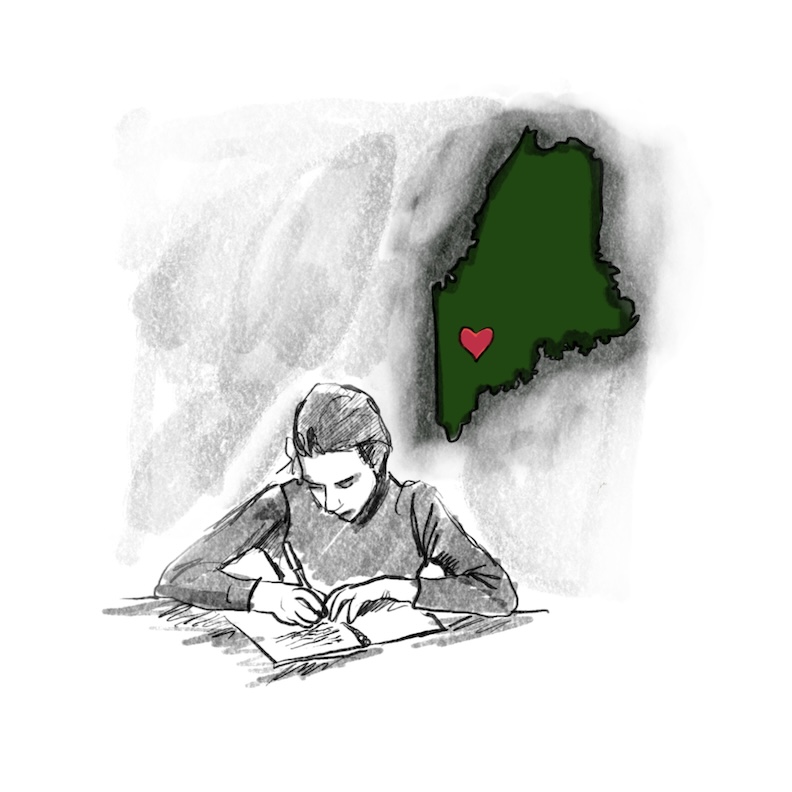Where do we go from here?
November 3, 2023
 This
piece represents the opinion of the author
.
This
piece represents the opinion of the author
.
 Lauren Russler
Lauren RusslerOn the last Wednesday of October, Lewiston found itself forever changed. Its name has gained the same infamy as countless other towns throughout the country. The kind of hurt that seeps out of the names Uvalde, Sandy Hook, Columbine—at least for a little while—is felt when the name Lewiston leaves one’s tongue. And, as of writing this column, 18 other victims have had their names take on the same tinge of sadness. Eighteen sons and daughters, 18 friends, 18 lives. Eighteen pairs of eyes that witnessed their particular world. Eighteen stories that ended as abruptly and tragically as countless others. Eighteen of them are gone now. Eighteen.
I am very lucky that I did not lose anyone directly. But Maine, no matter how big, has a way of finding you. Everyone knows everyone else in a way that means you’ll feel the loss. No one can see the future but I feel we all will be grieving. This is a time of loss for all of us.
I am not going to speculate about the man who created this tragedy. I do not want to give him my word. If God sees me in his good graces, whatever terror or revenge he wanted will be unsuccessful, and we will only remember who we lost—not whatever evil message he wanted to share. There is a time and a place for understanding why the radically isolated and unwell do what they do, and it is not here. I want to talk about what I have always talked about in this column. I want to talk about the lives of the people who made me. I want to talk about what to do now. What do we do about something like this?
Guns played a role in this tragedy—namely by enabling the perpetrator to kill as many people as possible. However, the gun culture that created the incident in Lewiston is relatively new to the state. It’s new everywhere. Gun culture in the United States often paints itself as being rooted in an ethos of tradition, but the paranoid gun culture of today is an extremely new, artificial one. It’s not the gun culture of my parents’ childhood where it was common to leave hunting rifles in the back of the car, even when in public areas, nor the gun culture of my grandparents who used guns to manage now-dwindling animal populations interfering with crops and dairy cattle.
Many gun advocates attempt to counter this by explaining that modern gun culture is rooted in the American Revolution—but the reality is that it is a product of marketing and post-9/11 paranoia. It’s an artificial tradition created (like many) by advertising. But it has become as ingrained and emboldening to mass shooters as many other parts of our cultural ethos because it has seeped into our older guns-as-tools culture in places like Maine.
Informing gun owners of this history is a task beyond the scope of this paper. But what isn’t is understanding why we never go anywhere. We never go anywhere with the gun debate because, for a significant minority of Americans, guns have become a part of the narrative they tell themselves about their culture. That minority is currently politically privileged for a variety of reasons. As the demographics of this country shift, though, that is likely to change. In the meantime, we sit in the culture wars between a falsified tradition and a burgeoning future—both deeply rooted in the social changes of the second half of the twentieth century. No one is likely to win in the middle of these deeply violent growing pains. But perhaps there is some sort of cold comfort in the fact that this is the result of a transitory state rather than a final one. Perhaps, one day, we will be unified enough to see change.
I know that for many, waiting is not a satisfying answer to the question posed by mass shootings. Even if our patience wins in the end, so many people would suffer the same fate as Lewiston’s 18, lest we forget them. If I could ask anything of my brothers and sisters, as an American, it is to not forget them. Do not forget that they did not have to die. Let it influence how you see the world and how you vote, regardless of what you see as a solution. Sit with this loss. Maybe, one day, it’ll tell us where to go from here.
Comments
Before submitting a comment, please review our comment policy. Some key points from the policy:
- No hate speech, profanity, disrespectful or threatening comments.
- No personal attacks on reporters.
- Comments must be under 200 words.
- You are strongly encouraged to use a real name or identifier ("Class of '92").
- Any comments made with an email address that does not belong to you will get removed.

thanks for your words Henry. your points about the evolution of gun culture are well made.
we must have courage, I think, to act with compassion (every day, over and over again) in the collective effort to build a different future led by different values. we can’t see over or around the walls blocking the path but courage keeps us moving ahead somehow.
alison mcconnell ’04
auburn ME